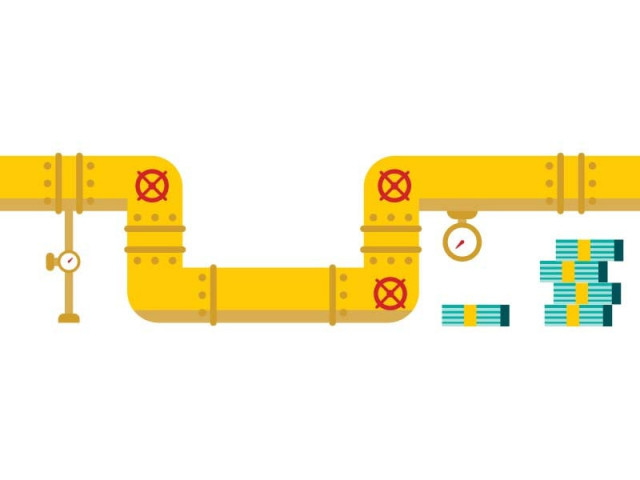Gas sector to get Rs76b against Rs230b requested
If OGRA does not enforce the WACOG on time, the gas sector’s circular debt will further increase

Gas prices may increase further for exporters and domestic consumers in the next fiscal year, as the government considers allocating Rs76 billion for gas sector subsidies in the new budget. This allocation falls short of the Ministry of Energy’s demand of Rs230 billion.
The Ministry of Energy’s demand is based on providing subsidised imported gas to domestic and industrial consumers and clearing pending arrears.
The proposed allocation of Rs76 billion is approximately 66%, or Rs153 billion, less than what the Ministry of Energy sought to meet the requirements of providing cheaper gas, according to Ministry of Energy sources.
The Rs76 billion allocation includes Rs20 billion grants for the Reko Diq project to cover interest costs on a Rs65 billion loan. The government borrowed this loan to cover Balochistan’s share in the project.
The Rs76 billion allocation is also Rs256 billion less than the estimated gas sector subsidies for the current fiscal year. The Ministry of Finance, which initially allocated Rs74 billion, now estimates gas subsidies at Rs330 billion for this year. This figure includes the requirements of the Reko Diq project, which do not strictly fall under the category of subsidies.
The Ministry of Finance proposed the allocations for the fiscal year 2023-24 assuming that the Oil and Gas Regulatory Authority (OGRA) would timely determine the weighted average cost of gas (WACOG), by considering the price of local and imported gas.
If OGRA does not enforce the weighted average gas prices on time or takes longer than usual to determine the estimated revenue requirements for this and the next fiscal years’, the gas sector’s circular debt will further increase. As of the last fiscal year, the stock of gas sector debt had surpassed Rs1.6 trillion.
The government recently raised gas prices in an attempt to eliminate the gas sector debt, but due to delays in implementation of decisions and low allocation, there may be a further increase in the debt. Companies like Pakistan State Oil (PSO), Sui Northern Gas Pipelines Limited (SNGPL), and Sui Southern Company Limited (SSGC) have been crippled financially due to non-payment of their dues.
According to sources, the Ministry of Finance has not allocated funds to provide subsidies for the supply of Re-liquefied Natural Gas (RLNG) to exporters in the next fiscal year. The Ministry of Energy had requested Rs50 billion to provide highly expensive imported gas to exporters at local gas price rates.
The government is facing pressure from exporters to review this decision. For the current fiscal year, it had allocated Rs40 billion for exporters’ subsidies, which has already been exhausted.
The Ministry of Energy also requested Rs125 billion to provide imported LNG at subsidised rates to domestic consumers in Punjab and Khyber-Pakhtunkhwa (K-P). However, the allocated amount for this purpose was only Rs25 billion, significantly lower than the required Rs202 billion for this fiscal year.
The Ministry of Finance has allocated only Rs30 billion for domestic consumers to cover the price until OGRA enforces the new weighted average cost of gas based on a mix of local and imported gas costs.
In February of this year, the Economic Coordination Committee (ECC) of the Cabinet instructed the incorporation of WACOG to determine revised revenue requirements for gas companies. However, OGRA does not seem inclined to prescribe another increase in gas prices at the moment.
The government has also set aside funds to cover the shortfall in guarantees given to Asia Pacific Limited and PAPCO amounting to Rs13 billion.
The Energy Ministry requested Rs10 billion in subsidies to cover exchange rate losses incurred by PSO on the import of petroleum products. However, the Ministry of Finance did not allocate funds for this purpose, indicating that the government may recover the cost by increasing petrol prices.
For the outgoing fiscal year, no allocations were made for exchange rate losses, but the Ministry of Finance now estimates subsidies of Rs40 billion under this category. In the second fortnight of May, OGRA recommended a Rs2.8 per litre increase in petrol prices, but the government reduced it by Rs12, not fully recovering the exchange rate losses from consumers.
For the next fiscal year, the energy ministry requested Rs17 billion in subsidies to cover exchange rate losses from imports from Kuwait under the Kuwait Petroleum Company deal. However, the finance ministry has not indicated any budget as the deferred payment facility for oil from Kuwait has expired since February.
The finance ministry may also allocate Rs15 billion to cover the interest cost on the loan taken by the government to pay for Balochistan’s share in the Reko Diq project under an international settlement deal. Additionally, an impact of Rs5 billion is expected on the budget due to the Reko Diq project in the next fiscal year.
Gas supply and pricing have become major issues in Pakistan, complicated further by court cases and stay orders. The government also aims to disconnect gas supplies received by exporters for in-house electricity production, but this matter has also become disputed.
Published in The Express Tribune, May 21st, 2023.
Like Business on Facebook, follow @TribuneBiz on Twitter to stay informed and join in the conversation.


















COMMENTS
Comments are moderated and generally will be posted if they are on-topic and not abusive.
For more information, please see our Comments FAQ